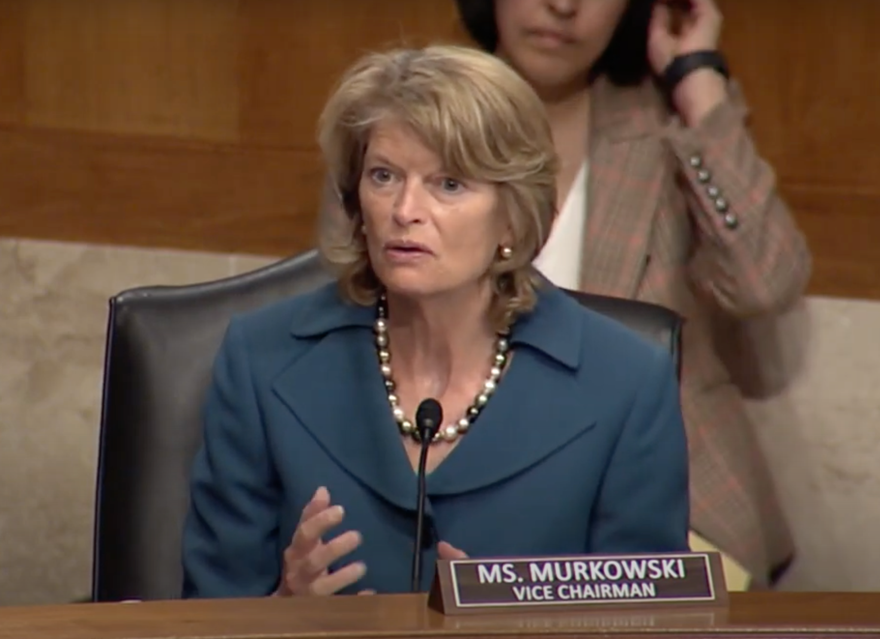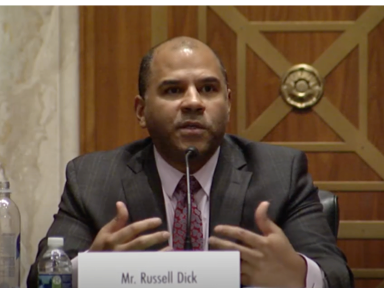Vice Chairman Murkowski Emphasizes Importance of the Tourism Industry to Alaska Native Communities
Invited Alaskan witness, Mr. Russell Dick, President and CEO of the Huna Totem Corporation Testifies at Committee Oversight Hearing
This week, Senator Lisa Murkowski (R-AK), Vice Chairman of the Senate Committee on Indian Affairs, underscored the importance of tourism to Alaska Native communities and the entire Alaskan economy at a hearing, “Examining the COVID-19 Response in Native Communities: Native Tourism Economies One Year Later.”
“Native Tourism touches on so many extraordinary aspects of Indian Country and our Alaska Native communities, of Native Hawaiians: vibrant cultures and languages, economic empowerment, resiliency, and the opportunity to share Native history and traditions and perpetuate native culture for future generations,” Murkowski said. “In Alaska, we know firsthand the importance of tourism to our state’s economy. In 2020 alone, the cancellation of the cruise ship season has caused an estimated revenue loss of over $90 million to the State, $98 million to local governments, and over $1 billion in lost revenue for local businesses.”
Vice Chairman Murkowski reiterated the effort she has made to alleviate the Passenger Vessel Services Act (PVSA) restriction that prevents cruise ships from transporting passengers between Washington State and Alaska. She welcomed testimony from, Mr. Russell Dick, the President and CEO of Huna Totem Corporation, a Native Village Corporation formed under the terms of the Alaska Native Claims Settlement Act (ANCSA). His testimony spoke directly to the impact of a federal law like PVSA, which limits Huna Totem’s ability to provide for jobs and the economy for a small Native community such as Hoonah, as well as the broader opportunities to the Native people in the region.

Pictured: Senator Murkowski providing an opening statement on May 12, 2021
Click here to watch Vice Chairman Murkowski’s full opening statement.
During her questioning, Vice Chairman Murkowski posed questions to Mr. Russell Dick on what it would mean to Hoonah to not have a tourism season. Click here to watch.

Pictured: Mr. Russell Dick testifying on May 12, 2021
In her closing remarks, Vice Chairman Murkowski stressed impacts to the state and the need to allow for some semblance of a tourism season, which is critical to the economic livelihoods of the many Alaskans and Alaska Native people affected by the pandemic. Click here to watch.
Excerpts below are from Mr. Dick’s testimony on behalf of Huna Totem Corporation.
Our Community
“Hoonah is located on Chichagof Island. We, as members of the Xúna Kaawu, have thrived in the area for thousands of years. Our community is remote; it is not connected to any other community by a road system, runs significantly on diesel power, and has limited economic opportunity. Economic activities that largely defined our economy in the twentieth century—timber and fishing—are at a low ebb. However, we are a resilient people, and we are fortunate to have had an opportunity to develop a sustainable tourism-based economy for our village.”
“Ground was broken at Icy Strait Point in 2001. We invested in ourselves, making significant renovations and modern additions to Hoonah’s historic salmon cannery. The Celebrity cruise ship MV Mercury made the inaugural call to Icy Strait Point in 2004. Through bold leadership, strategic investment, and historic resolve, we brought Icy Strait Point to life, ushering in a new era of economic opportunity for the community of Hoonah and our shareholders, providing employment, financial contributions, and a strong tax base to support the community.”
“For over 16 years, Huna Totem has been on a journey to develop Icy Strait Point into a world-class destination. Since opening in 2004, we have hosted over two million passengers, and received ships calls from every major cruise line traveling to Alaska. We are the single largest employer and contributor to local sales tax in Hoonah, having contributed over $60 million directly to the community over that 16-year period.”
“The pandemic has affected us all. For Hoonah, the pandemic has meant the loss of at least a half million guests and the concomitant economic contribution to our community. Icy Strait Point will return, not because we are a corporation per se, but because we are the corporation—the village corporation—that Congress created to serve our people. But we need the Federal Government’s help and cooperation now to do that.”
Economic Impact of the Pandemic
“The shutdown of the cruise industry has profoundly disrupted our local economy, as 80 percent of our local tax base comes from tourism. Icy Strait Point normally employs over 250 people during the cruise ship season, with nearly 80 percent local and Alaska Native hire. All of this occurs in a village of less than 800 residents.”
“Icy Strait Point is a great example of what Alaska Native village corporations can do for their communities. Beyond the tax contributions to our community, the jobs and the infusion of dollars into the local economy, the heart of our business is truly the families and their children who own our business and are empowered by it. During the 2019 season, Icy Strait Point employed 27 of the 32 students from the high school in Hoonah. Think about that: we exist to create opportunity for our kids in their own community. Isn’t that the core of what parents want for their children in their hometowns? This is what Congress intended when it created Alaska Native corporations.”
“But we have faced an enormous challenge as a consequence of the pandemic. Where in 2019 we received 167 ship calls carrying roughly 270,000 visitors, the 2020 season was cancelled. In 2020, Icy Strait Point expected to receive 212 ship calls carrying over 440,000 passengers and employ over 250 people with a direct economic contribution of over $10 million to the community of Hoonah. At this time, over 20 months have passed since Alaska has seen a cruise ship. The result has been closed local businesses, the loss of hundreds of jobs, a slowdown in economic activity, an increase in food insecurity, lost ferry service, and decreased funding to the City of Hoonah, amongst other negative effects. As you know, the 2021 season is now imperiled. The loss or further delay of the 2021 summer cruise season will continue to devastate the communities throughout Alaska, like Hoonah, that depend on tourism. A quick restart to cruising in Alaska is critical. Leadership from the City of Hoonah, the community, and Icy Strait Point are all eager for cruise ships to return.”
Excerpt on PVSA reform
“Huna Totem urges Congress to reform the Passenger Vessel Safety Act (PVSA) in a manner that will best support American jobs. Congress needs to recognize that large passenger ships have not been built in the United States for over 60 years. As it pertains to large cruise ships, the PVSA’s mandated use of U.S.-built vessels is protectionism for an industry that simply does not exist. The price is paid here in Alaska, in our region, and in our village.”
“The problems associated with the PVSA have been exacerbated by the pandemic, during which Canada has closed its ports to cruise ships, making it currently impossible for Alaskan cruises to carry on even after the Federal Government has signed off on cruising.”
“To avoid violating the PVSA, ships that do not meet its requirements must visit a foreign port at some point during their voyage. For cruises to Alaska, that means a stop in Canada. But Canada’s ports currently are off?limits to cruise ships through February 2022—making visits to Alaska by such vessels impossible without a change in the statute or administrative waiver, which is also proving difficult to obtain.”
“The reality is that our community currently faces a situation in which we might have no economy this summer to support our employees — 80 percent of whom are local and Native hire —because Congress has not dealt with the PVSA.”
The following witnesses testified during the oversight hearing:
- Mr. Dennis Alvord, Acting Assistant Secretary for Economic Development, U.S. Economic Development Administration, U.S. Department of Commerce, Washington, DC (Virtual)
- Mr. Anthony Rodman, Acting Director, Office of Indian Economic Development, U.S. Department of the Interior, Washington, DC (Virtual)
- Mr. John De Fries, President and Chief Executive Officer, Hawai’i Tourism Authority, Honolulu, HI (Virtual)
- Ms. Sherry Rupert, Chief Executive Officer, American Indian Alaska Native Tourism Association, Albuquerque, NM (Virtual)
- Mr. Russell Dick, President and Chief Executive Office, Huna Totem Corporation, Juneau, AK (In person)
For witness testimony and video of the oversight hearing, click here.








